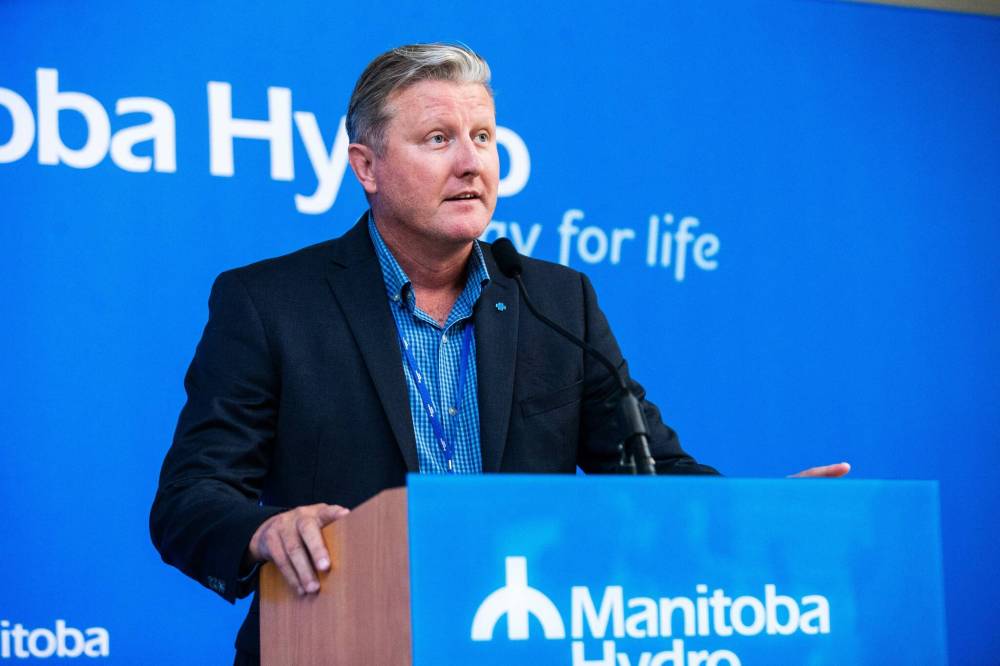Manitoba Hydro and first steps with Indigenous Peoples
Advertisement
Read this article for free:
or
Already have an account? Log in here »
To continue reading, please subscribe:
Monthly Digital Subscription
$1 per week for 24 weeks*
- Enjoy unlimited reading on winnipegfreepress.com
- Read the E-Edition, our digital replica newspaper
- Access News Break, our award-winning app
- Play interactive puzzles
*Billed as $4.00 plus GST every four weeks. After 24 weeks, price increases to the regular rate of $19.95 plus GST every four weeks. Offer available to new and qualified returning subscribers only. Cancel any time.
Monthly Digital Subscription
$4.99/week*
- Enjoy unlimited reading on winnipegfreepress.com
- Read the E-Edition, our digital replica newspaper
- Access News Break, our award-winning app
- Play interactive puzzles
*Billed as $19.95 plus GST every four weeks. Cancel any time.
To continue reading, please subscribe:
Add Free Press access to your Brandon Sun subscription for only an additional
$1 for the first 4 weeks*
*Your next subscription payment will increase by $1.00 and you will be charged $16.99 plus GST for four weeks. After four weeks, your payment will increase to $23.99 plus GST every four weeks.
Read unlimited articles for free today:
or
Already have an account? Log in here »
Hey there, time traveller!
This article was published 27/08/2024 (529 days ago), so information in it may no longer be current.
Manitoba Hydro’s board of directors recently held its first meeting in the North in nine years. It was, hopefully, the beginning of a more collaborative and mutually respectful relationship with Indigenous people in northern Manitoba.
Many First Nations in the North, including Fox Lake First Nation, have seen their lands flooded, their livelihoods destroyed and their communities upended by the construction of hydro dams and transmission lines since at least the 1960s.
A Clean Environment Commission report released in 2018 detailed allegations of sexual abuse and violence against Indigenous women and men in the 1960s and 1970s by Hydro workers and RCMP officers.

MIKAELA MACKENZIE / FREE PRESS
Ben Graham, chairman of the board of directors of Manitoba Hydro.
Residents of Fox Lake told the commission at the time how their homes were bulldozed to make way for residential development to house Hydro workers during that period.
For many First Nations people, the recent Hydro board meeting held on Aug. 13 (the first in the North since 2015) was an opportunity to remind the publicly owned company how its mega-projects have negatively affected their communities and livelihoods.
“We made sure they saw the everyday impacts of hydro development on our lands, where the majority of Manitoba Hydro’s largest infrastructure is situated,” said Fox Lake Chief Morris Beardy. “We had a lunch on the bank of the Nelson River and they could see the ongoing effects on our territory.”
The board’s meeting in the North was also a way of exploring new ways of developing mutually beneficial relationships with Indigenous communities.
Hydro has been given a mandate by the provincial NDP government to advance reconciliation with First Nations, Métis and Inuit nations. The board meeting was a good first step towards achieving that goal.
Hydro says it is also committed to establishing an Indigenous advisory circle. The new body is expected to examine ways of ensuring future hydro development is a win-win for all stakeholders and that Indigenous communities are properly consulted on Hydro activities.
“Gatherings such as this is how relationship building should have begun decades ago,” Beardy said. “Unfortunately, it didn’t at that time and we are still living with the impacts. We were clear that Manitoba Hydro’s future does not need to reflect its past.”
The recent efforts represent a shift in thinking for the Crown corporation. However, mere words and a single board meeting in the North are not enough to make real progress on reconciliation.
Hydro board chairman Ben Graham said he doesn’t know when the board will convene its next meeting in the North. He called the recent gathering a “one-off.”
That is somewhat disappointing. The board should commit to regular meetings there — perhaps once a year, or once every two years — to demonstrate its commitment to listening to and working with Indigenous communities.
It is critical that the Crown corporation ensures First Nations, Métis and Inuit nations benefit from hydro developments in the future, that the impacts of generating stations on their communities are minimized and that a true partnership emerges.
There have been some positive developments in recent years between Hydro and Indigenous communities, including economic partnerships with four First Nations — Tataskweyak Cree Nation, War Lake First Nation, York Factory First Nation and Fox Lake Cree Nation — on the Keeyask generating station, located 725 kilometres northeast of Winnipeg.
Still, more needs to be done. Hydro cannot right all the wrongs of its past overnight.
It can, though, strengthen its commitment to reconciliation with more concrete plans to consult and collaborate with Indigenous communities. A “one-off” meeting should be seen as a good first step — but a step that has to be followed by many more.



